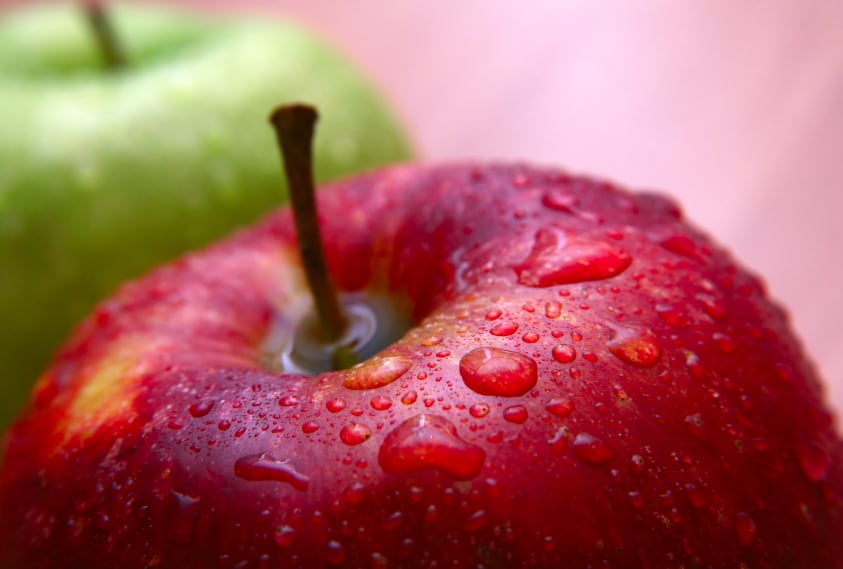According to fresh research, published in Frontiers in Microbiolody, organic apples harbour a ‘more divers and balanced bacterial community’. This could, the scientists behind the study suggest, make them ‘healthier and tastier’ than conventional apples, as well as being better for the environment.
The benefits of bacteria
The more we come to understand about the bacteria in our gut – the microbiome – the clearer it is that maintaining a healthy balance has profound consequences for wellbeing.
“The bacteria, fungi and viruses in our food transiently colonize our gut,” explained study senior author Professor Gabriele Berg, of Graz University of Technology, Austria. “Cooking kills most of these, so raw fruit and veg are particularly important sources of gut microbes.”
To understand more, Professor Berg’s team analysed the microbiome of one of the world’s most commonly consumed fruits – the apple. This, he said, is an under-developed area of research.
“83 million apples were grown in 2018, and production continues to rise,” noted Professor Berg. “But while recent studies have mapped their fungal content, less is known about the bacteria in apples.”
The researchers compared the bacteria in conventional store-bought apples with those in visually matched fresh organic ones. Stem, peel, flesh, seeds and calyx (the straggly bit at the bottom where the flower used to be) were all put under the microscope.
Organic apples have more bacterial diversity
In general, the researchers found that organic and conventional apples were occupied by ‘similar numbers’ of bacteria. By combining the average bacteria count for each component of the apple, the researchers were able to estimate that a typical 240g apple will contain around 100m bacteria.
The majority of the bacteria are located in the seeds, with the flesh accounting for most of the remainder. People who eat the apple fore therefore increase their bacterial intake by around 10m.
The question, then, is whether these bacteria are good for digestive health.
The study noted that gut health is liked to bacterial diversity. In this regard organic apples would seem to outperform their conventional counterparts.
“Freshly harvested, organically managed apples harbour a significantly more diverse, more even and distinct bacterial community, compared to conventional ones,” explained Berg. “This variety and balance would be expected to limit overgrowth of any one species, and previous studies have reported a negative correlation between human pathogen abundance and microbiome diversity of fresh produce.”
Specific groups of bacteria known for health-boosting potential were also found in greater abundance in organic apples.
“Escherichia-Shigella – a group of bacteria that includes known pathogens – was found in most of the conventional apple samples, but none from organic apples. For beneficial Lactobacilli – of probiotic fame – the reverse was true.”
The researchers even suggested that this could explain any difference in taste perception between organic and non-organic apples.
“Methylobacterium, known to enhance the biosynthesis of strawberry flavour compounds, was significantly more abundant in organic apples; here especially on peel and flesh samples, which in general had a more diverse microbiota than seeds, stem or calyx.”
What about the freshness factor?
Perhaps importantly, there was a difference in the time between harvest and analysis for the conventional and organic apples included in the study.
The conventionally grown apples were packaged and refrigerated for ‘days’ before analysts. In contrast, the organic apples were analysed immediately following harvest. Both sets of apples were also from different farms, albeit in the same region of Austria.
Nevertheless, the researchers highlighted similar patterns are found in fungal communities of organic and non-organic fruit.
“Our results agree remarkably with a recent study on the apple fruit-associated fungal community, which revealed specificity of fungal varieties to different tissues and management practices,” commented Birgit Wasserman, co-author of the study.
Since the apple fungal community is also specific to each apple variety, the bacterial analyses ought to be repeated in other cultivars, they noted.
“The microbiome and antioxidant profiles of fresh produce may one day become standard nutritional information, displayed alongside macronutrients, vitamins and minerals to guide consumers,” said Wasserman. “Here, a key step will be to confirm to what extent diversity in the food microbiome translates to gut microbial diversity and improved health outcomes.”
Source
An Apple a Day: Which Bacteria Do We Eat With Organic and Conventional Apples?
Frontiers in Microbiolody
DOI: https://doi.org/10.3389/fmicb.2019.01629
Authors: Birgit Wassermann, Henry Müller and Gabriele Berg*



